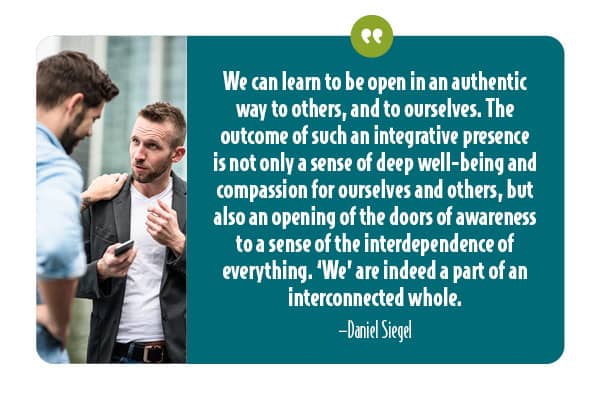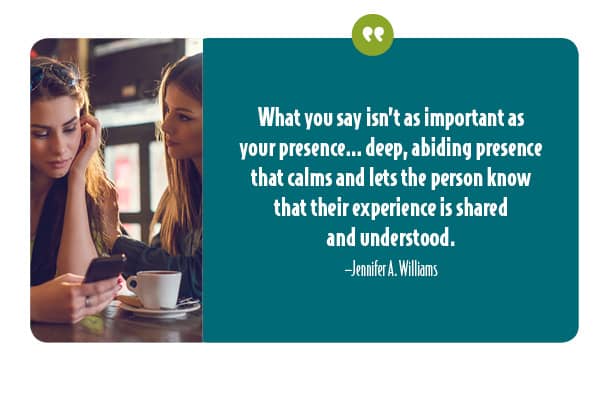We have all been there—someone we care about is hurting, and we want to support them but don’t know how. Should we empathize or show compassion? What is the difference between empathy and compassion? And which one should we express when?
Let’s take a closer look at the differences between empathy and compassion to understand how to apply them in everyday life. Understanding each one better can help us understand each other more authentically.
Related reading time: 7 minutes
 What Is Empathy?
What Is Empathy?
Empathy is defined as “the ability to understand and share the feelings of another.” Empathy allows us to put ourselves in someone else’s shoes; to see things from their perspective. It helps us connect with people at an emotional level so that we can better comprehend what they are going through. It also helps us build meaningful relationships with those around us.

After teaching empathy for the last couple of decades, it’s been my experience that when we empathize effectively, the person’s intense emotions (that hijack their thinking brain) dissipate. This calming effect allows them to recenter and engage the logical part of their brain. Often, they will immediately turn to solving their dilemma and taking action on their own behalf.
For a hands-on workbook to learn to empathize, identify when we slip into using feeling stoppers, and how to respond empathetically, check out our online store.
Objections to Empathy
However, according to Paul Bloom’s philosophy outlined in his book Against Empathy: The Case for Rational Compassion, empathy has its limitations. Bloom argues that too much empathy can be dangerous because it clouds our judgment and causes us to overlook facts in favor of emotion. He calls for more rational forms of empathy instead—ones that consider our emotions and intellect.
It's true, when we don’t use our cognitive creativity and abilities to respond, as emphasized by Bloom, it introduces the vulnerability of emotions overriding good decisions and a reaction that is too emotional. We may overreact based on similar experiences of our own. Or we may take on someone’s pain, maybe even feel responsible for their emotions, or end up allowing another’s emotions to negatively impact our own well-being. We can also overextend ourselves to support a person and open ourselves up to empathy burnout.

It is my premise that it is not the skill that could make empathy inadequate or inferior to compassion, but rather its inappropriate application and a person getting bogged down with their feelings and resorting to using feeling stuffers.
Another of Bloom’s objections to empathy is that “our empathetic experience is influenced by what we think about the person we are empathizing with and how we judge the situation that the person is in.” Of course, it is; we’re human! And I would add that people also tend to judge HOW the person is expressing their emotions and handling the situation.
Example of Empathy
Let me give you a personal example of what Bloom is referring to. I was teaching an empathy workshop years ago, and the participants pair to practice empathizing. A young woman called me over in exasperation, telling me there was absolutely no way she could empathize with her partner. “She is being ridiculous” were her exact words. Her partner was angry because a friend had bought a brand-new car.
Judgment of her partner’s feelings prevented the woman from empathizing; her value system prevented her from giving another person permission to experience what she had deemed irrational or “ridiculous” feelings. I agree with Bloom that to empathize (or even to show compassion) has, at its core, the need to be nonjudgmental.
Emotions are evolutionarily adaptive and they contain the ingredients we need to make sense of our experiences and resolve inner conflict.
 Back to the workshop: now I paired up with the woman and modeled empathizing with her to the group using the same above scenario. Do you know what happened?
Back to the workshop: now I paired up with the woman and modeled empathizing with her to the group using the same above scenario. Do you know what happened?
Once the upset woman felt understood, she said, “I know my feelings are silly; it just made me feel left out and I’m actually really happy for my friend. It shows me what’s possible for me, too!” The car purchase had felt like a betrayal to the woman since the two of them had formed an unconscious sense of “belonging” through a private clunker car club.
Feeling understood, as previously mentioned, returned her to the logical brain, and she resolved the clashing emotions within herself. This fast shift is the power of empathy!
Loving nonattachment is imperative for us to empathize effectively. We cannot project our own values and experience as a prerequisite in deciding if the person “deserves” the effort to empathize with them. To accomplish this feat, we must clean our filters of cognitive priming (or clear the whiteboard of our human experience) to see and understand the person from THEIR perspective.
The more we integrate past experiences and effectively regulate our emotions, the less judgment we feel toward others. Empathy is best expressed from a mindful and nonjudgmental state.
What Is Compassion?
The New Oxford American dictionary defines compassion as “sympathetic pity and concern for the sufferings or misfortunes of others; deep awareness of the suffering of another coupled with a desire to relieve it."
Compassion originated from compati, which literally means to suffer with. Its Latin root is pati, which means to suffer, and the prefix com- denotes with.
Unlike empathy, which focuses on being present and helping the person feel heard, compassion takes a step back and looks at things from a larger perspective. It allows us to recognize that being human means there will be suffering. Compassion invokes a response to ease suffering in meaningful ways whereas empathy doesn’t necessarily move to make the person feel better, only to help them feel heard, understood, and cared for.
One of the foundational principles of compassion is moral reasoning with a broader focus and response not based on a singular person or situation with a narrow focus. Compassion’s power lies in seeing every human being as equal in their right to justice, happiness, health, and well-being.
Related reading: "People Who Lash Out in Anger Need Compassion—and Boundaries!"
Does Logic Oppose Emotions?
It can seem like we have two opposing systems: emotions versus logic, gut feelings versus rational consideration of facts. However, rather than see them opposing one another, I believe that we become the best version of ourselves when all systems integrate and work together.

It is possible to reach a place of monitoring and regulating oneself so that we are free to empathize less unencumbered by personal influences.
Empathy is not blind. It is not just a cluster of mirror neurons firing or emotions taking over. When well done, it encapsulates the best of us, and we respond wisely and intentionally with care.
I believe that compassionate empathy encapsulates Bloom’s description of compassion. It uses the higher mind to understand, seek truth, and hold others accountable for their own well-being while emotionally connecting with them through compassionate caring.
Compassionate empathy is a combination of empathy and compassion that allows us to respond appropriately in any situation by combining our emotional intelligence with our intellect to prevent us from being engulfed by another’s emotions. Compassionate empathy enables us to relate with people individually while still recognizing more significant hardships happening around us. Thus, we cement these two essential qualities so that we can use them together with intentionality.
You can become a more effective communicator by understanding compassionate empathy and how to apply it in various scenarios. You’ll learn to understand your emotions and those of others around you while bringing justice and higher-level reasoning to invoke world change.

All Interpersonal Skills Require Us to Be Fully Present
Whether we call it compassion or empathy, one foundational truth exists for both: How we respond to a person or situation depends on the relationship, person, circumstances, and timing.
Sometimes, we may lean more toward compassion; in other situations, such as a doctor speaking to a patient, we may need to utilize our logic more through cognitive empathy. When speaking to a young child, our emotional empathy may need to be fully active.

Deep dive into the three kinds of empathy (emotional, cognitive, and compassionate).
A person can express empathy and also weigh facts and reason to consider a holistic view. For instance, is it the right time to provide nightly meals for a good friend who is grieving when you’re stretched very thin, recovering from illness, and desperately in need of self-care? Probably not. However, when you reason further, you realize it doesn’t have to be “all or nothing.” You can volunteer once or twice a week by increasing the amounts of meals you’re already planning for your family.
We’re not just seeking to empathize or be compassionate with others; our goal is also to be compassionate with ourselves. Thus, this endeavor includes self-awareness of our limitations and needs. The more self-aware and self-compassionate we can be, the freer we are to empathize with others and respond with compassionate action.
Related reading: "Empathy vs Sympathy: What's the Difference?" (Includes a more in-depth understanding of empathy and an accompanying infographic for easy reference.)
To learn more about how to develop emotional literacy, empathy for yourself and others as well as how to set effective boundaries in your life, try our online course today. You'll be glad you did!








